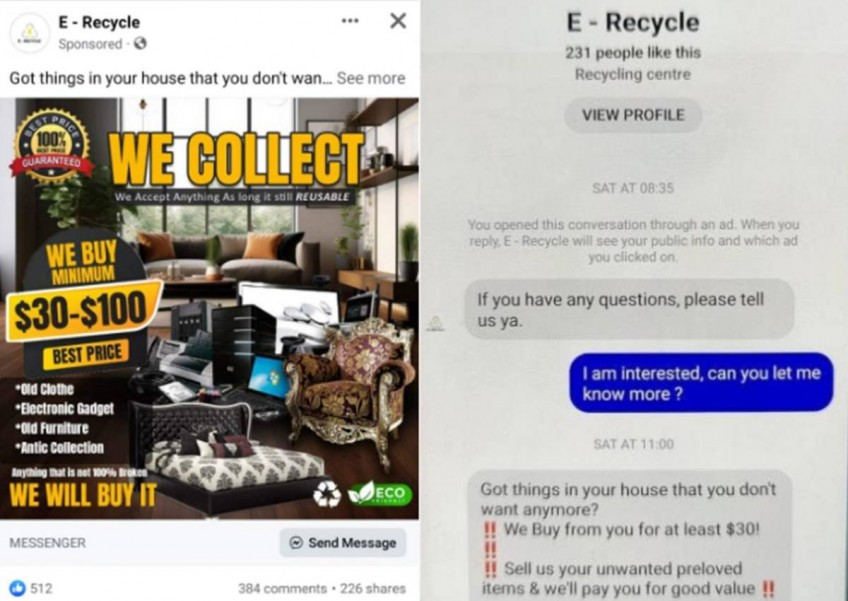Gone in 15 minutes: Woman loses over $72k after downloading app to sell pre-loved kitchen appliances


SINGAPORE – A 68-year-old woman lost over $72,500 from her POSB bank account in 15 minutes after she downloaded a third-party app in a bid to sell her pre-loved kitchen appliances online.
What she had downloaded turned out to be malware which enabled scammers to control her Android phone and drain money from her POSB savings account.
The victim, who wants to be known only as Madam Abdul, a customer service officer, had on Sept 23 chanced upon a Facebook advertisement by a purported recycling company called E-Recycle that wanted to buy pre-loved furniture and electronics.
She was enticed by the deal, which offered between $30 and $100 for each pre-loved item, with free pick-up.
Hoping to sell several pre-loved kitchen appliances, including a steamboat set and grill, she contacted the so-called buyer through Facebook Messenger.
Unacquainted with e-commerce platform Carousell and reluctant to sell the electronics to the karung guni (rag-and-bone collectors) at a low price, she felt the Facebook advertiser offered convenience and more attractive rates.
The buyer texted her on WhatsApp and they conversed till late at night.
The next day, she spoke to the buyer on the phone and asked if he would also like to buy a leather suitcase of hers.
While on the phone, he said he had transferred her $50 through PayNow, and would pay the remaining amount upon collection and valuation of her items.
He asked her to open her POSB digibank app to check if she had received the payment. She followed his request but did not see the money.
[[nid:649979]]
Madam Abdul thought the payment transfer would require some time, so she did not think too much of it.
He later instructed her to download a third-party app called I-Recovery to list the items for a staff member to collect.
While on the phone with him, she received another call and wanted to hang up on him to answer it.
Her mobile phone screen began flickering, so she tried to decline the call, but all the buttons on her touchscreen were unresponsive. She tried to uninstall the app, but was also unable to do so.
Alarmed, she told the buyer about it. He assured her that her phone was faulty. She became suspicious as her phone was not faulty before their call.
“I asked him: ‘Are you a scammer?’ He said that he was not a scammer and not to offend him by comparing him to scammers that had posed as mooncake sellers,” she said.
Realising something was amiss, she told her roommate about the incident. Her roommate advised her to immediately turn her phone off and to call POSB.
The bank officer told Madam Abdul that the scammers had raised her transaction limit, which was originally set at $3,000. They transferred about $68,500 out of her POSB savings account and another $4,000 shortly after.
Madam Abdul, who works at a training school, said she had set aside that money for her retirement, insurance and medical expenses.
“When I heard that almost 90 per cent of my savings were lost, I wanted to cry but no tears came out. That was my money saved over four decades. I knew about scam cases but still got tricked. I felt frustrated and foolish,” said Madam Abdul, who has one son.
Her son, who wants to be known only as Mr Hakim, said that while he was heartbroken to hear that his mother was scammed, he understands that anyone could have fallen for the scam.
“We had read news about such scams but didn’t realise that the threat was so close to us. She thought scammers would pose as sellers, not buyers. This is probably a new tactic and she wasn’t aware of,” the 43-year-old educator added.
The mother and son said they hope to put aside their worries to focus on recovering the money. Madam Abdul sought help from POSB to have her account frozen and a new ATM card issued, and she made a police report on Sept 24.
The police confirmed that a report had been made and investigations are ongoing.
POSB did not respond to a request for comment.
Madam Abdul has since changed her mobile phone and had her ATM card replaced as a precaution.
She said: “I have learnt to be more careful online. I was too eager to sell the items quickly.”
In the first half of 2023, at least $10 million was lost by more than 750 scam victims due to unauthorised banking transactions performed by malware, which also resets the victims’ phones.
There has been a series of scams recently in which “sellers” instruct interested buyers to click on links to download third-party apps that download malware into their phones, enabling scammers to control their devices remotely and drain their bank accounts.
[[nid:651555]]
Amid mounting mobile security threats, Singapore’s cybersecurity watchdog Cyber Security Agency of Singapore has released a list of recommended antivirus apps, with features like malware and phishing detection.
OCBC, UOB and DBS have also recently announced tighter controls aimed at protecting customers against malware-enabled scams.
For example, DBS is progressively pushing out a new anti-malware tool on its DBS/POSB digibank app, starting in September. The anti-malware tool restricts users’ access to the DBS app if it detects the presence of malware, apps downloaded from unverified app stores with accessibility permissions enabled, or ongoing screen sharing on a customer’s device.
This article was first published in The Straits Times. Permission required for reproduction.